With 80% of Americans having purchased something online in the past month alone, appearing in the top positions in SERP gives you unique opportunities to increase your revenue. [1]
But what exactly is SEO for marketplaces, and why is it different from traditional website SEO?
How can you ensure your marketplace stands out in search results, attracting both quality sellers and eager buyers?
In this blog, we are serving you proven strategies for improving your marketplace SEO in 2025 on a silver platter, that will increase your visibility and growth.
What is SEO for Marketplaces & Why Is It Important?
SEO for marketplaces involves optimizing your platform to rank higher in search engine results, making it easier for potential sellers and buyers to find you.
Unlike traditional website SEO, marketplace SEO requires a more nuanced approach because you are dealing with multiple sellers, various products, and different user intents.
SEO helps your marketplace appear at the top of search engine results, increasing the likelihood of attracting both buyers and sellers.
Given that 53% of all website traffic comes from organic search, think about what all that visibility can do for your marketplace’s growth.[2]
Higher rankings, of course, mean more clicks and visits to your marketplace. This increase in traffic can lead to more transactions and higher revenue.
If you’re still not sure whether it’s the right approach, we’ve got answers will SEO work for your business in our guide.
SEO for Marketplaces: Top Strategies in 2025
As marketplaces are getting a bigger share of the ecommerce market, SEO becomes tougher and tougher.
To keep your marketplace competitive and visible, it’s essential to stay ahead with the latest SEO tactics.
Use Proper Structured Data
You need to know what is technical SEO and how it influences your rankings, directly or indirectly. For example, implementing schema markup on product pages is proven to increase your rankings and click-through rates.
Schema markup provides search engines with structured data, and they’ll better understand your content. And because your content speaks the language of search engine crawlers, you’ll be rewarded with higher positions.
Let’s see some of the most important schemas for marketplace SEO
Review Schema
Adding review schema to your product pages can display star ratings and review counts directly in search results, making your listings more attractive to potential buyers.
If you sell smartphones, showcasing a product with a “4.5-star rating from 200 reviews” can help potential buyers quickly gauge the product’s popularity and quality. This visible rating can increase click-through rates as users are more likely to trust products with positive reviews.
Product Schema
Product schema provides detailed information about your products, such as price, availability, and specifications.
For an item like the Samsung Galaxy S21, include details such as its price, stock status, and key features directly in the search results. Highlighting “In stock,” “Price: $299,” and “Free shipping” can attract more attention and clicks from potential buyers.
FAQ Schema
Adding FAQ schema can help address common customer queries directly in search results, improving user experience and potentially reducing bounce rates.
Include FAQs about shipping policies, return procedures, and product care tips to provide quick answers to potential buyers.
Breadcrumbs
Breadcrumbs improve site navigation and help both users and search engines understand the structure of your site. Implementing breadcrumb structured data makes your navigation clearer and more user-friendly.
Local Business Schema
If your marketplace operates in specific regions, using local business schema improves visibility in local searches, helping you attract more region-specific traffic.
Include details such as your business address, operating hours, and contact information. For instance, displaying “Open today until 8 PM” and “Located in downtown Seattle” can draw in local customers searching for specific products in your area.
Focus on On-Page SEO Elements
The focus of on-page SEO is to optimize individual pages to rank higher. This creates exponential SEO growth for marketplaces, as all these well-ranking pages influence the whole website.
It sends the signal to Google and other search engines that your website is reputable and user-friendly.
Optimizing Title Tags and Meta Descriptions
The title tag is the headline that appears in search engine results, while the meta description provides a brief summary of the page content. Both should include relevant keywords and be compelling enough to encourage users to click through to your site.
And that’s their main role: high CTR signals to Google that your content is worth ranking.
Here are some best practices for marketplace SEO
- Your primary keyword should be as close to the beginning of the title tag as possible. This helps search engines understand the relevance of your content quickly.
- Craft meta descriptions that not only describe the content but also include a call-to-action (CTA) to encourage clicks.
- Avoid duplicating title tags and meta descriptions across pages. Each page should have a unique and specific title and description.
Examples:
Meta description: “Discover a wide range of organic skincare products. Shop now for natural beauty solutions that nourish and rejuvenate your skin. Free shipping on orders over $50!
Title tag: Instead of “Natural Beauty Solutions | Buy Organic Skincare Products,” use “Organic Skincare Products | Natural Beauty Solutions.”
Using Heading Tags Effectively
Headings structure your content and make it easier for search engines and users to understand the hierarchy and main points of your page.
And when users have a great experience and engagement on your website, that signals to Google that your content is valuable.
- Use keywords and related terms naturally in H2 and H3 tags to signal content structure and relevance.
- Optimize header tags to target featured snippets by posing questions and providing concise answers.
For example, use an H2 tag like “What Are the Benefits of Organic Face Cream?” followed by a brief, bullet-pointed list of benefits to increase the chances of appearing in a featured snippet.
Optimizing Images with Alt Text
Images are essential for engaging users, but they also need to be optimized for search engines. Adding descriptive alt text to images helps search engines understand the content of the images and can improve your page’s visibility in image search results.
- Craft alt text that accurately describes the image while naturally including relevant keywords.
- Make sure that the alt text is contextually relevant to the surrounding content. This not only helps with SEO but also improves accessibility for users relying on screen readers.
- Before uploading images, rename the files to include descriptive, keyword-rich names.
Examples:
Instead of “face cream,” use “Lavender-Infused Organic Face Cream in Eco-Friendly Packaging.”
Content Marketing for Marketplace SEO
Product Pages
Product pages are the heart of your marketplace. They are your “money” pages and you should pay special attention to them if you want to rank high and convert traffic into customers.
- Provide detailed, keyword-rich descriptions that highlight the unique features and benefits of each product. Avoid generic descriptions and focus on what sets your products apart.
- Encourage customers to leave reviews and ratings on product pages. This not only adds fresh, user-generated content but also builds trust and influences purchasing decisions.
- Use high-resolution images and product demonstration videos to give customers a comprehensive view of the product. Optimize these media files with descriptive filenames and alt text.
- Use WebP image format to minimize image impact on technical performance.
- Implement structured data we’ve talked about on product pages to provide search engines with detailed information about your products.
- Link to related products and relevant blog posts within the product description to improve navigation and keep users engaged longer on your site.
Blog Posts
Blog posts are an excellent way to provide valuable information to your audience, showcase your expertise, and improve your marketplace’s SEO through targeted keywords and content.
They serve the purpose of passing link juice and authority to your product pages but also attract qualified traffic that’s not ready to buy immediately.
But to write high-quality blog posts, you need to perform comprehensive keyword research.
- Identify terms and phrases relevant to your products and industry. Incorporate these keywords naturally into your blog content.
For example, for a blog post on “Natural Skincare Routines,” use keyword variations like “organic skincare routine” and provide your readers with detailed descriptions of each step.
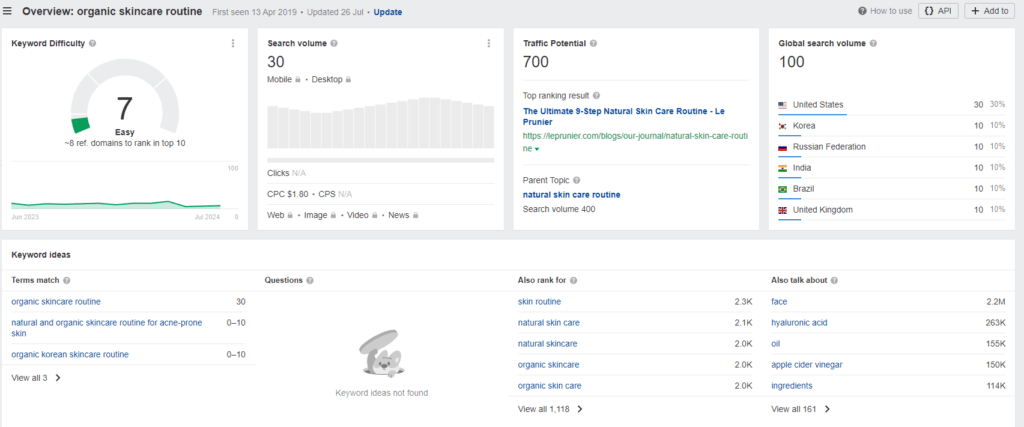
- Create in-depth guides and how-to posts that provide valuable insights and practical advice. These types of content are highly shareable and can attract backlinks.
You can create a comprehensive guide titled “The Ultimate Guide to Organic Skincare: Tips, Tricks, and Product Recommendations” that covers everything from daily routines to specific product benefits.
- Offer downloadable content upgrades, such as eBooks, checklists, or templates, in exchange for email sign-ups. This can help grow your email list and nurture leads.
For example, in a blog post about “Eco-Friendly Skincare Tips,” offer a free downloadable checklist titled “10 Steps to a Sustainable Skincare Routine.”
Off-Page SEO
Off-page SEO are all the activities performed outside your website to improve its search engine rankings.
Unlike on-page SEO, which focuses on optimizing content and structure within your site, off-page SEO involves efforts to increase your site’s authority and reputation through external methods.
One of the most powerful off-page SEO strategies is building quality backlinks.
Backlinks are links from other reputable websites that point back to your marketplace. Each backlink acts as a vote of confidence, signaling to search engines that your site is trustworthy and authoritative.
For instance, if a popular tech blog links to your marketplace selling electronics, it boosts your credibility and can improve your search rankings.
Additionally, focusing on off-page SEO strategies can significantly enhance your marketplace’s overall authority, helping you secure higher search engine rankings through quality backlinks. Learn more about effective techniques by exploring our dedicated off-page SEO services.
Some of the most popular ways to build links are guest posts, creating shareable content and finding broken links.
Creating high-quality, shareable content such as infographics, videos, and comprehensive guides can naturally attract backlinks.
Finding broken links on other websites and suggesting your link as a replacement is another strategy that works. This method not only helps improve the user experience on the target site but also earns you a valuable backlink.
Using tools like Check My Links, you can find broken links on related blogs or websites. Reach out to the site owner and offer your relevant content as a replacement.
Real-World Examples of SEO for Marketplaces
Alphagreen.io – CBD Marketplace
Alphagreen.io, a marketplace specializing in CBD products, experienced a problem with visibility in search engines and maintaining their position after a major Google Core Update in December 2020.
They had to do something to change this, so they hired Nuoptima to create and execute an SEO strategy for their marketplace.
Like Google Core update wasn’t enough, they also faced another great challenge – the CBD market is highly competitive.
What did Nuoptima do to turn things around for Alphagreen?
Content
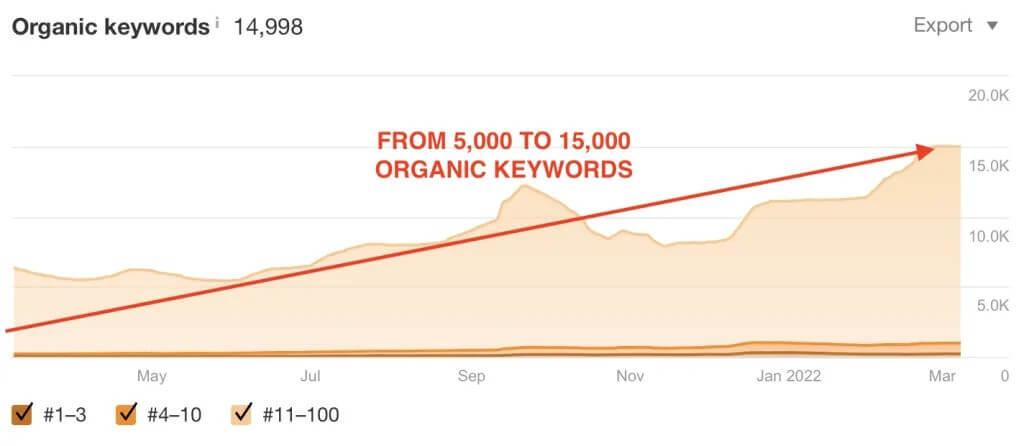
Nuoptima started with keyword research and helped Alphagreen to produce detailed, informative, and engaging content around those. They tailored the content to match user intent and that’s what helped them rank. The content they created was blogs, product descriptions, and articles about CBD products and their benefits.
With more than 30000 words written on a monthly basis, Alphagreen now ranks for more than 15000 relevant keywords.
Technical SEO
Nuoptima knew how important structured data is for SEO marketplaces.
Implementing structured data, such as product and review schema, helped search engines better understand and index the site’s content. This also led to enhanced search result snippets, making listings more attractive to users.
They also improved the site’s speed and responsiveness to gain higher rankings and provide users with a better experience on every device.
Link Building
But the content isn’t enough when we’re speaking about SEO for marketplaces, especially in the CBD industry.
That’s why Nuoptima’s next focus point was to acquire high-quality backlinks from reputable websites in the health and wellness niche. This initiative boosted Alphagreen’s domain authority and credibility.
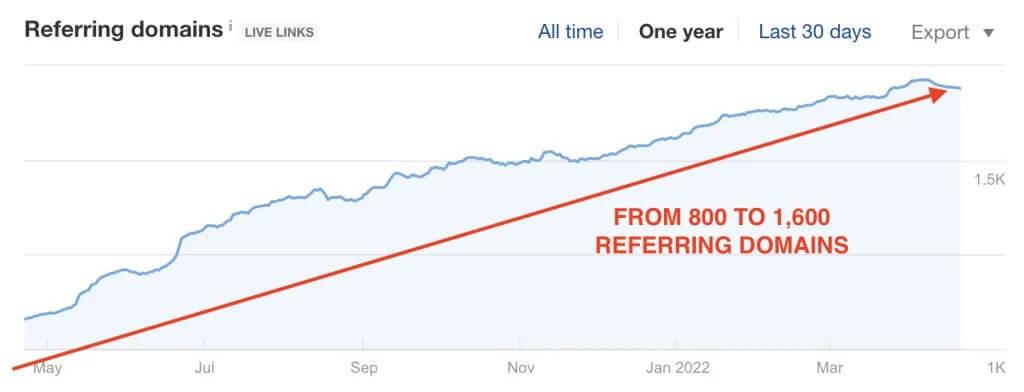
Results Achieved
Through these SEO efforts, Alphagreen.io saw a dramatic 552% increase in organic traffic, recovering and surpassing their pre-update levels.
- Improved Search Rankings
The marketplace achieved higher rankings for numerous competitive keywords in the CBD niche.
Yhangry
Yhangry, a unique online marketplace connecting users with private chefs, wanted to increase their organic traffic through SEO and they thought Nuoptima was up for that task.
Partnering with Nuoptima, Yhangry implemented a series of SEO initiatives that resulted in significant growth.
As a relatively new marketplace, establishing trust and credibility among potential users was extremely important.
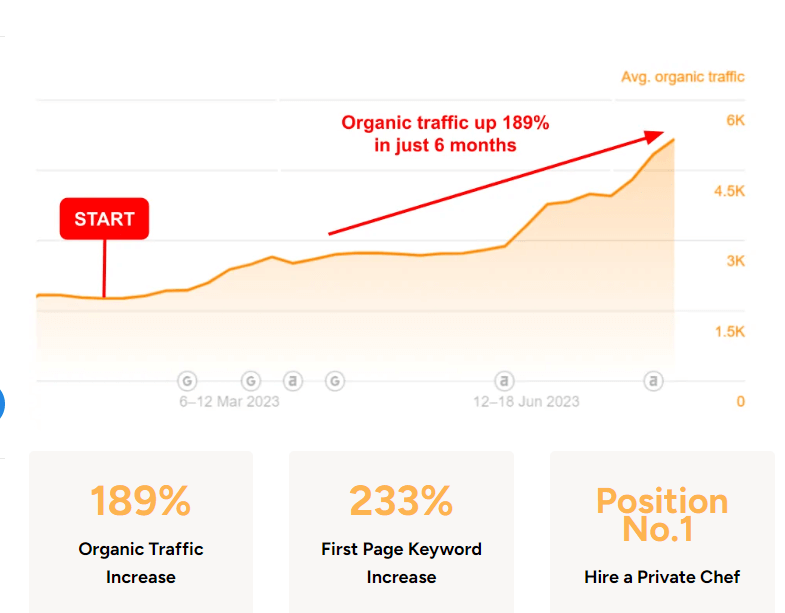
Nuoptima performed keyword research and identified hundreds of terms that potential customers use to search for private chef services.
The focus was on creating engaging and informative content, including blog posts, chef profiles, and service descriptions.
The content was tailored to address user queries and needs, such as ‘how much is a private chef’, ‘private chef in London’ and ‘hire chef for birthday party’
Nuoptima had two approaches: to optimize content to rank locally, and for event-specific keywords.

And what were the results of those efforts?
- Traffic up by 189% in just 6 months
- 233% increase in first-page keywords
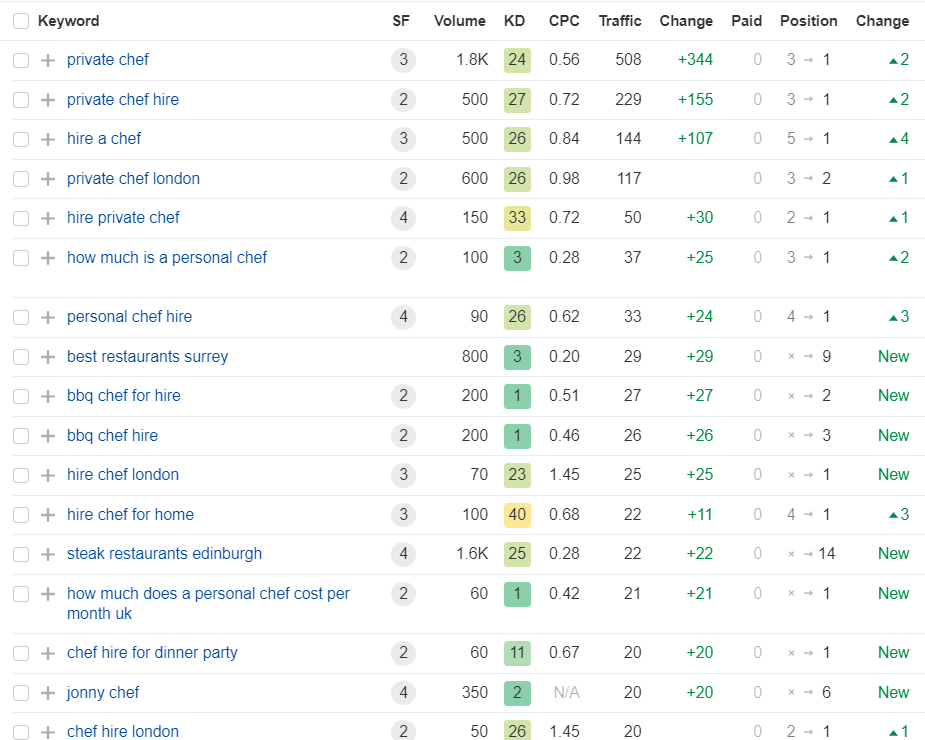
If you want SEO services that drive conversions for your marketplace, book a call with Nuoptima’s dream-team that already achieved remarkable results for businesses like yours.
FAQ
Marketplace SEO involves optimizing a multi-vendor platform to rank higher in search engine results, making it easier for potential sellers and buyers to find products.
Ensure each product listing has a unique, keyword-rich title, detailed description, high-quality images, and comprehensive attributes, and use schema markup to enhance visibility in search results.
Content marketing attracts organic traffic and establishes your marketplace as an authoritative source through blog posts, guides, and tutorials, while user-generated content adds valuable, engaging material.



